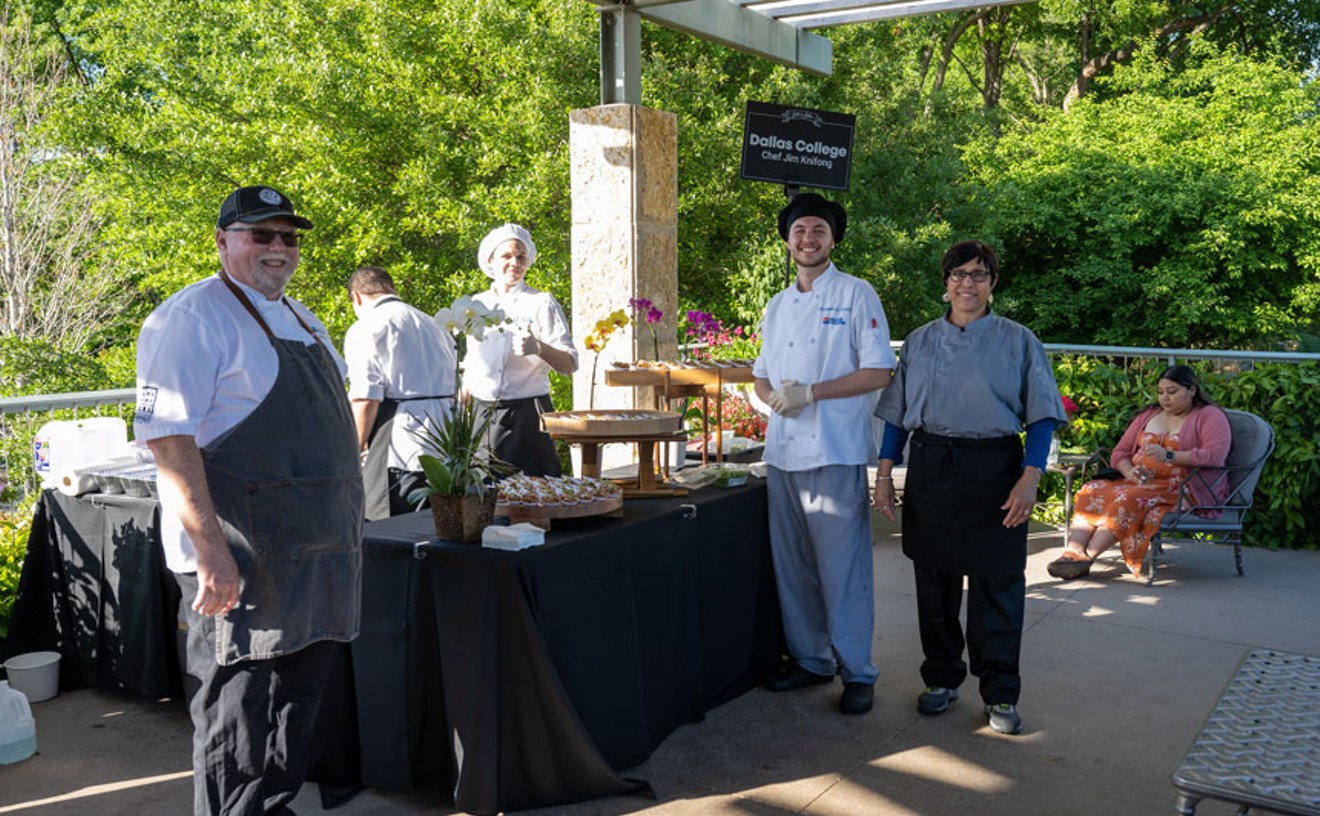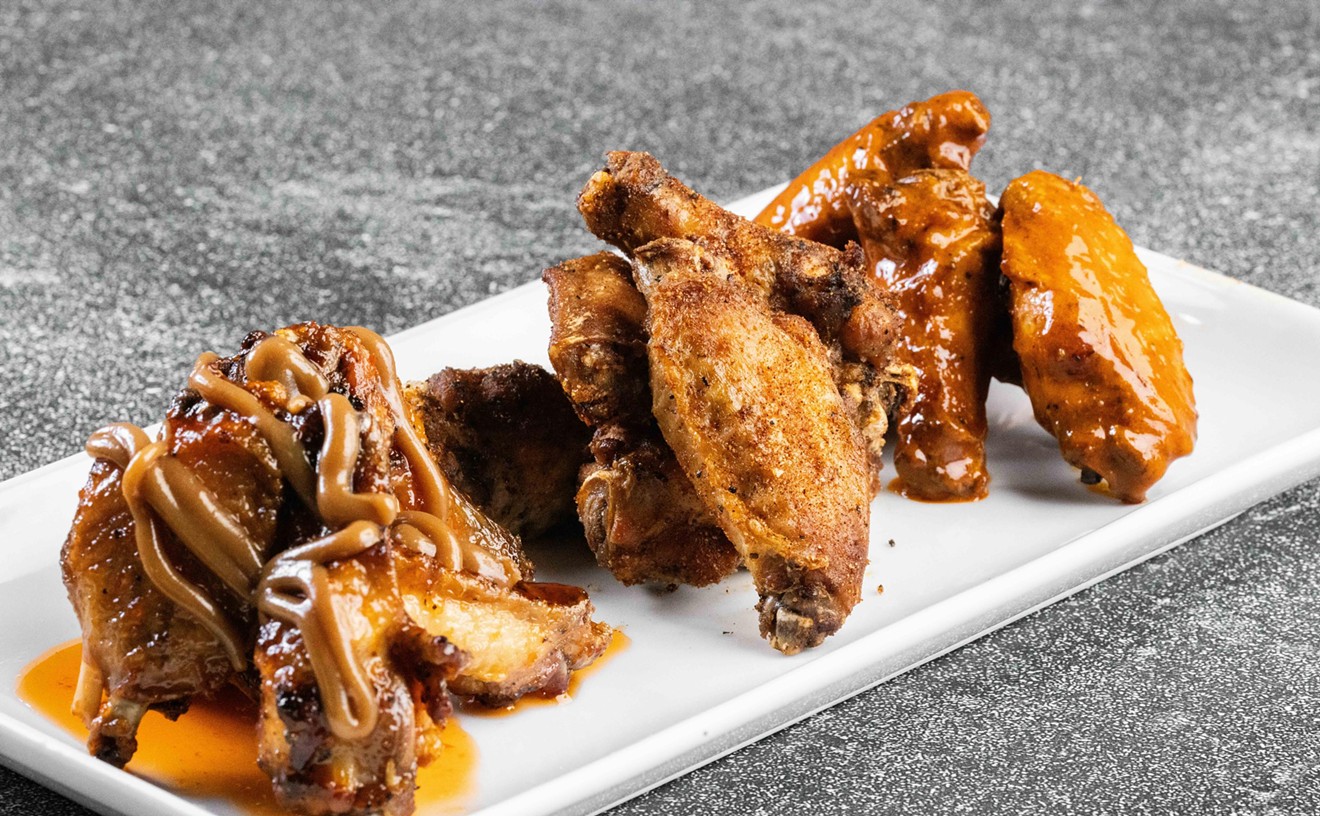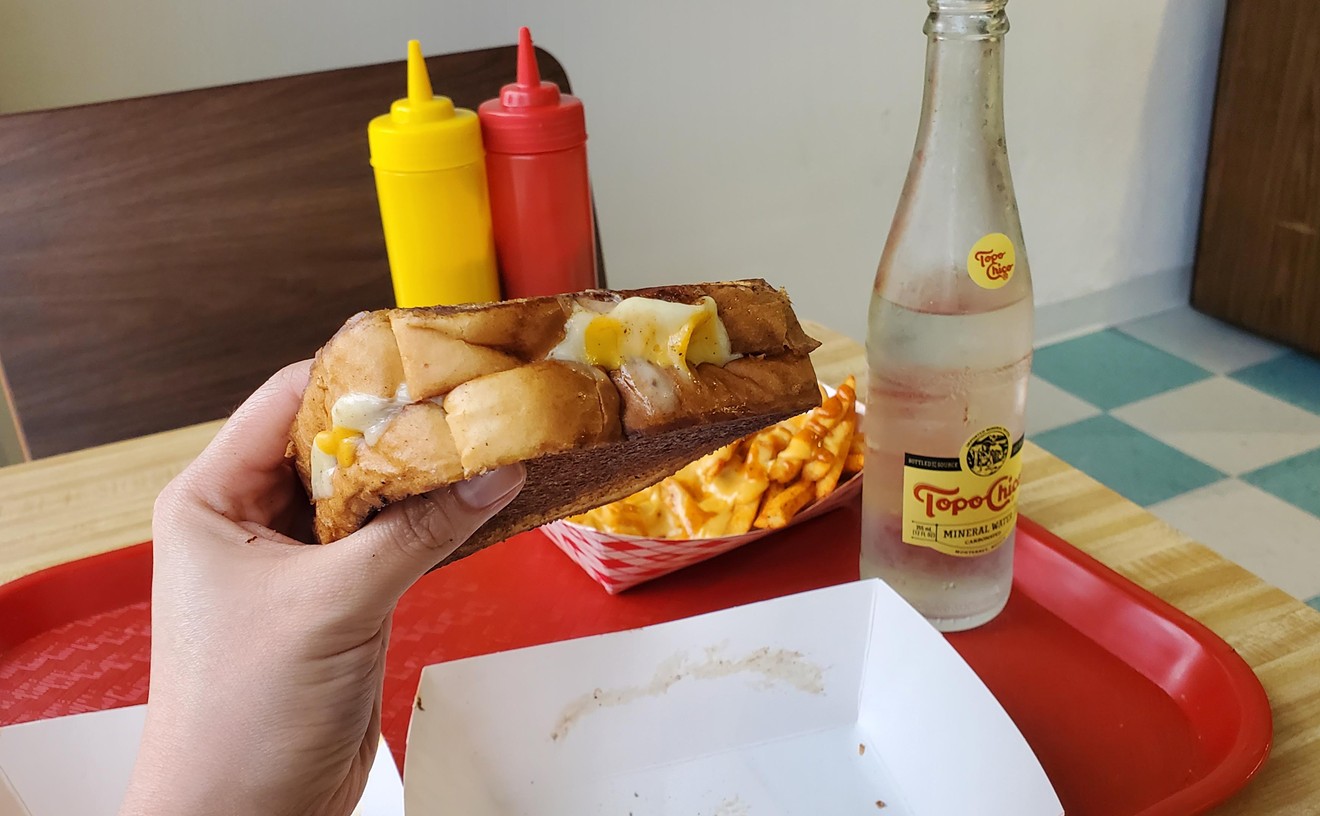It isn't just chefs and restaurateurs who make the Dallas dining scene tick. For the last few years, local bartenders have been crafting drinks that are just as complicated as the dishes that come out of the city's best kitchens. Still, it seems as if Dallas' diners are still figuring out whether or not they'd rather spend their drinkin' money on a few expertly made cocktail or several shots of Fireball.
Helping guide them along the way is Henry's Majestic barman Alex Fletcher. If you've spent any time in Dallas' finer watering holes, like Victor Tangos and The People's Last Stand, you've probably consumed one of Fletcher's carefully made cocktails. Now that he's settling into his new role as bar manager at Henry's Majestic, I sat down with him to talk about his journey through Dallas' bar scene, the palate of the Dallas drinker, and the weirdest cocktail he ever made.
Can you talk about your experience in Dallas? You've worked at a lot of Dallas' best bars. I actually started out with this company about thirteen years ago. My first job in a bar was as a bar back at The Quarter, and I was there for about five and a half years. Then I opened Barcadia and worked there for a few years, moved on to The Dubliner for a while. Then Omar Yeefoon brought me on at People's Last Stand. I worked as general manager there after he left, then moved to Victor Tangos and took over their bar program before moving here.
What made you want to work in such a variety of environments? Victor Tangos was always a place I really respected. The food was always on point, the service was great, and the drinks were solid. They had this really great infrastructure, but their beverage program needed a little bit of an update. They weren't asking for that, but I threw out some ideas and they loved it as far as I know. That environment taught me how to do really fast paced craft cocktails, which was a pretty unique situation in that we were layering so many elements in each drink. After I had been there just over a year, this opportunity came into my lap and it was exciting. I could build the bar program from the ground floor, and I'd never been able to do that before. This menu is my own.
Craft cocktails are huge right now. What suddenly made people care about what was in their glass? I think the fresh ingredients in craft cocktails are really appealing, but I think it mostly has to do with bartenders and chefs getting together to complement what was coming out of the kitchen. If I'm doing a watermelon cocktail, the chef will pickle the rinds and use them in a salad. It creates this kind of symbiotic feel between the bar and the kitchen, and those are usually pretty separate entities.
The term "bartender" isn't really accurate anymore. You're still pouring drinks, but you guys are doing shit that is just as complicated as what happens in the kitchen. Do you think that label still fits, or is there some other term that's more fitting? I think the term bartender is a good thing. The term "mixologist" is way overused, and I look at myself as a bartender. The most important thing to me in taking care of the bar is to take care of my guest. No one cares about the hours of prep that goes into making a drink, they just want something awesome in their glass. The six hours that it takes to get to that awesome drink in the glass is for me to worry about, not them. It all has to do with care and loving in what you're doing. Being a bartender is a very respectable thing. So many of these guys who are successful now started out as bar backs and have worked their way up. If someone says "oh, you're just a bartender," it's harder than you think.
Do you think that people think that being a bartender is an easy job? There are some skewed aspects to it, I think. People think your life is just a constant party. My life is basically spreadsheets, costing, and tasting. There is a lot of fun in this industry and I love the face time with our customers, but it can be really stressful. Especially with what we're doing with all these craft cocktails. We're practically creating a dish in a glass, and we have to do that while 300 thirsty people watch us. It's fun, it's a great time, but it's more than you think.
Do you think most of the people who come into your restaurant are trying to drink better? I'll personally drink a High Life and a shot of Jameson. I don't need anything fancier than that, but I think this resurgence of the classic cocktails has given people insight into what's actually out there. That has everything to do with knowledge. For the longest time, nobody knew how to make these drinks, and if they did know the recipes, they were just bad.
Why do you think no one knew how to make old-school cocktails for so long? I think the palate changed through the years. In the 1980s, drinks got sweeter and sweeter and the old drinks just fell out of fashion. Flavored vodka blew up, which opened up a whole new world of drinks, but you didn't see very many watermelon vodka juleps or whatever. They were kitschy, 80s drinks that stayed longer than anybody thought they would.
Do you think we were stuck in that era until just recently? On both of the coasts, they've been doing craft cocktails for a while. Dallas is about five years behind anything that is happening in New York or San Francisco, and it took a really dedicated group of bartenders to start caring about what they were serving people. A lot of people from New York, like Jason Kosmas, came in and started introducing systems and educating people, and it's sparked this new generation of bartenders.
Do you think bartenders wanted to be creative all along, and they just didn't think the drinks would sell? I would say bartenders have always been creative, but the ingredients have changed. We've always been mixing up different cocktails for menus and making new drinks, but they weren't as refined as the ones that are coming out now. When cocktails are out on your bar and presented, people see how gorgeous they are.
You have a pretty solid culinary mind, what with all your crazy infusions and savory drinks. Do you have an interest in food? I think in another life, I should have been or probably was a chef. I'm not sure how I ended up behind the bar instead of in the kitchen, but I love cooking as much as I do working the bar. I cook at home as much as possible, I cook here as much as possible, and that's part of the marriage between the bar and kitchen that I talked about earlier.
How is working with Chef Roe? She has a ton of experience in that kind of bar-driven kitchen atmosphere, so it seems like it would be a good blend of interests and talents. We work really well together. We're just constantly trying to figure out what the next interesting thing is going to be. We go back and forth with each other and just see where our palates take us when it comes to ingredients.
Speaking of palates, what is the Dallas palate when it comes to drinks? What do they want? It's hard to say. There's of course trends that drive what people order, like savory cocktails for example are suddenly popular. Right now, people are really wanting cocktails that are "not too sweet." That's probably the most common request that I'm getting behind the bar now, and it's really exciting. There are so many bitter elements that you can use to alter the flavor of drinks that people would have just not been open to in the past.
Chefs obviously don't get to interact with diners in the same way that bartenders get to interact with drinkers. How do you take the temperature of your crowd and know when you need to change things up?
The disadvantage that the kitchen has is that they can't see the reaction from the customer. The biggest part of this job is being able to read people, and figure out what they want, even if they don't know. I'll make someone a drink, and you can just kind of watch and see how it's going, or you can talk to them and see what they want.
Do you want something sweet or tart or bitter? That way, we can tailor something to exactly what that person wants in that point in time. I'll go so far as to ask people how their day is going, because that's going to influence how they feel about their drink.
Do you feel like you're ever constrained by people's expectations of what should be on the menu at a bar? Is there a specific set of flavors that people expect when they come here? There are people who lean toward the more normal, familiar drinks on the menu, and there's people who want something exotic. You have to be able to write a menu that somehow strikes a balance between those two things. I really like to use a lot of Asian flavors in my drinks, and hopefully it's pretty unique, but you can tell that people are intrigued by the idea of something like black sesame seed vermouth.
Do you think people realize how complicated it is to infuse spirits and make tinctures and all that? It seems like a lot of work. At the end of the day, what is in their glass is the only thing that is important. If it took us fifteen hours to make a cocktail and they're enjoying it, you feel like you've done something good. If people want to come help us prep they're more than welcome to, but I don't see that happening. It's all about the cocktail.
Speaking of sesame seed vermouth, what other kinds of crazy shit are you doing back there? Right now I'm doing a saffron martini that I really like. It's a bourbon-based drink with Cocchi Torino, and I made a saffron syrup and mix in a little bitters. It's really cool because it brings out all of the metallic elements in the saffron. It's really clean and nice. I'm also starting to do a lot of phosphate sodas, which are interesting. Phosphate is a tartening agent sort of like lemon juice, it was really big in the '50s, and I haven't really seen much of it around here. I made a few different phosphates for our new lunch menu. We also have a blackberry soaked absinthe in a Sazerac that really softens it up.
Is there something that you've maybe wanted to do that's just too crazy? I don't know, I just kind of do stuff, and if it works, it works. One time, I did a green curry pistachio Mai Tai at Victor Tangos that completely bombed. There were a lot of cool flavors there, but I don't think anyone there was really ready for it.
Is it a blessing or a curse that everyone, including chain restaurants, is picking up on craft cocktails and running with the trend?
It's absolutely a blessing. If you're able to work with good ingredients and make good drinks, more power to you. God forbid that someone has to go into a job and do work that they hate doing.
What does the term "craft cocktail" actually mean to you in practice? Is it just a trend? I think everything is a trend. The big thing though is that all of the classics are still around, and that's sort of like the mother sauces that you have in the kitchen. You start with these basic recipes and just switch ingredients around until you have something new. So sure, there will be ups and down in terms of the quality of cocktails, but craft cocktails have always been around.
What are your favorite drinks to mix?
My personal favorite is a Sazerac, and it has been for about eight years now. After that, I really like making everything. I've made so many different cocktails at this point that they're all kind of blurred together. But I drink crappy beer and Jameson. It's like working at a steakhouse, you still want Taco Bell when you get home.










